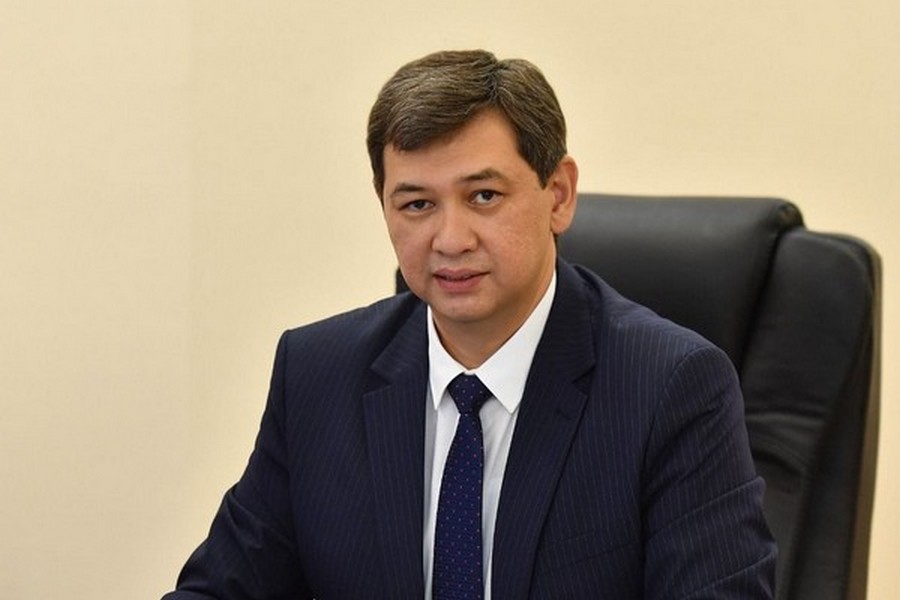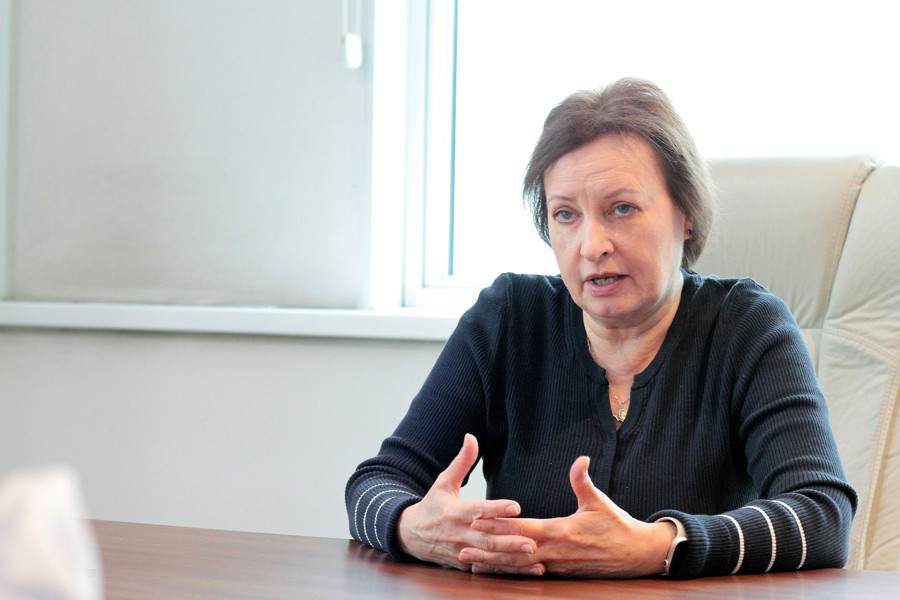Kazakhstan's Chief Medical Officer Erlan KIYASOV:
IN KAZAKHSTAN THE VACCINATION DRIVE AGAINST COVID-19 IS MODERATE

A campaign to vaccinate the population against coronavirus infection is being implemented in Kazakhstan for the fifth month. Since then over 1.4 million people have been inoculated with two vaccine doses, more than 2.5 million people vaccinated with the first dose. In total, 10 million citizens are to be vaccinated. Kazakhstan's Chief Medical Officer Erlan KIYASOV talked in an interview with Interfax-Kazakhstan about the vaccination drive, the epidemiological situation in general, measures taken to prevent the “Indian” variant from being imported.
- Erlan Ansaganovich, the Health Ministry has repeatedly stated the plans to achieve herd immunity to COVID-19 in the autumn of 2021. The autumn is just around the corner, how do you look to these plans now, will they be fulfilled or will the deadline have to be pushed back? What do you link rather unhurried pace of vaccination in the country with? Unwillingness and hesitancy of individuals whether to get vaccinated or a lack of the required vaccine stock in the country? What do you see the solution to the problem in?
- Currently all necessary conditions for vaccination have been created in Kazakhstan. The production of its own vaccine, bottling and procurement have swiftly been arranged. Taking into account the ongoing negotiations with the coronavirus vaccine manufacturers it is planned to receive about 10 million doses of vaccine by September this year, which will cover at least 60% of the batch of people to be vaccinated.
At the regional level, 1,378 vaccination centers have opened, logistics have been set up and the temperature regime is under control during vaccine transportation and storage. 12,898 trained medical staff are involved in the vaccination roll-out.
The public are changing their attitude towards the COVID-19 vaccine. If at the initial stage we were faced with great distrust, then there was an increased demand and willing persons got inoculated against COVID-19. Now the moderate vaccination drive is underway among the population.
According to the results of a select independent sociological survey conducted in April 2021, as notedt the main motivation to get vaccinated was the desire to protect their family in 65% of respondents, 30.9% wanted to protect themselves, 26% of respondents wanted to protect their society. 13.5% of those, who are ready to be or have already been vaccinated, believe that getting vaccinated is the best way to avoid a serious COVID-19 disease. 13.2% [of them] follow their general practioners’ advice. 9.6% have serious diseases such as diabetes, so it is important for them to get vaccinated.
While conducting the survey among respondents who are not ready for vaccination, it has been established that patients are worried about the presence of contraindications. Some believe that they have already been ill and have antibodies, and respondents are also worried about vaccine side effects. As one can see, everyone has different reasons given that the coronavirus infection is novel and vaccinations against it are being carried out for the first time, queries among the population, of course, will arise. For that the study into the public opinion and outreach work are underway. It should be noted that in our country vaccination is a voluntary procedure, and we must observe this rule so that the public can approach self-consciously the need for vaccination.
Vaccination allows lifting a number of restrictions for individuals who got fully vaccinated against COVID-19. These measures are set out in the chief medical officer’s decree dated May 3, 2021.
For example, Kazakhstani citizens and those who have a residence permit in Kazakhstan, etc., who are fully vaccinated against COVID-19, they are allowed to cross Kazakhstan’s state border by air, provided with any type of hospitalization, allowed to visit collectivley organized events without PCR testing, [the same applies ] to staff working on a rotation basis, medical workers after vacation, business trips, absence from work due to illness, students of medical universities and colleges.
- Are there any concrete agreements currently on the supply of vaccines against COVID-19 to Kazakhstan, in addition to available Sputnik V, Hayat-Vax, QazVac and CoronaVac? Will there be an alternative to these vaccines? When?
- Currently not all countries manage to offer their households a choice of vaccines against coronavirus . Thanks to ongoing negotiations with manufacturers Kazakhstan managed to ensure the supply of four types of vaccines from various manufacturers. In addition to Sputnik V, Hayat-Vax and domestic QazVac vaccines, a batch of 500,000 doses of CoronaVac vaccine produced by the Chinese biopharmaceutical company Sinovac Biotech Ltd has been delivered to the republic.
This vaccine is recommended by the WHO for immunization in emergency situations. Currently, the Health Ministry continues to negotiate with manufacturers regarding the [supply of] vaccines against coronavirus.
- Vaccination of those, who have already had COVID-19: the Sputnik V developer, [Mr.] Ginzburg, has said in many of his interviews that one dose of the Sputnik V vaccine is enough for those who have had the coronavirus. Getting a second dose of vaccine for those who had the coronavirus is "unnecessary," he says. Has the Health Ministry approached the developer on this matter?
- In accordance with the vaccine medical use guidelines it is recommended to vaccinate those who have had any coronavirus form 6 months after recovery and taking into account the assessment of their health condition before vaccination. There are no recommendations in the guidelines for people, who have recovered from COVID-19 whether they should get only one dose of the Sputnik V vaccine.
At the same time, the developers have recommended the Sputnik-Light single-use vaccine for those who have recovered, the purchase of which is currently under scrutiny.
- Are there currently severe COVID-19 cases in those who got vaccinated? How many vaccinated have contracted the coronavirus in Kazakhstan?
- In most cases people are protected against the disease by vaccination. But the risk of contracting the coronavirus exists after vaccination, as well as in the case of repeat illness in those who have had coronavirus, when even a person's own immunity does not always protect against the disease.
In such cases, it is important to know that vaccination protects a person against a severe course of the disease and serious complications, death. This is because the body is already familiar with the virus and can develop an immune response. In Kazakhstan after vaccination in general, no more than 0.03% of people from the total number of vaccinated people fell ill. Given that more than 2.5 million people have been vaccinated in Kazakhstan, the number of cases is insignificant. COVID-19 severe cases in vaccinated people have not been recorded.
Therefore, if to talk about the risk-to- vaccination benefit ratio, then vaccination definitely protects a human. A vaccinated person will not get sick, or get sick, but without the risk of having a severe form of the disease when it is necessary to get a ventilator connected or a lethal case is possible. Such conclusions were made at the global level, now the entire medical community is closely following vaccinations against the coronavirus, studying and gaining experience.
- Recently Mr. Tsoi stated a new forecast for the development of the epidemiological situation in the country. If to take, for example, the most pessimistic scenario in which, according to the minister, 95,000 infections are expected in June-September, will we have about 800 infections every day? Is this a calculation error or the coronavirus retreating ?
- In order to answer this question it is necessary to understand the purpose of forecasting. Worldwide forecasting is carried out not with the aim of predicting an incidence as a weather forecast, but using mathematical modeling to calculate various scenarios of the epidemiological situation development [in order to] conduct a risk assessment, possible consequences and work out prompt response measures. On the principle "forewarned is forearmed." Therefore, the forecast is made under an optimistic and pessimistic scenarios, calculations and a comprehensive risk assessment are carried out regarding the readiness of the medical system for the development of a particular scenario and possible consequences. Our main task is to prevent the pessimistic scenario development.
For example, in order to prevent a repetition of a complex "peak" epidemiological situation like in June 2020, when the healthcare system was not ready for such a high surge in the incidence, we have devised indicators being monitored daily. If risks increase , the Kazakh government takes rapid measures development through the interministerial commission to stabilize the situation and prevent the pessimistic scenario.
For example, in the case of a high risk, which we recorded on the eve of the 2021 Nauryz Holidays, when, during a sharp rise in the incidence among the population, the number of bed occupancy was increased, registration of the disease severe cases and a number of other alarming factors were increased. The Health Ministry immediately took measures to inform the public, introduced restrictive measures, which triggered some discontent in the society. But, in general, the population and business understand the need for these measures, and as practice has shown, such rapid response measures proved to be effective and justified, we successfully overcame this period without introducing strict lockdown measures.
Currently the stabilization of the coronavirus epidemiological situation in the republic , gradual exit of regions from the red zone are being observed, the incidence dynamics is being developing under the optimistic scenario.
Therefore there is no mistake with regard to the calculation of the development of the pessimistic scenario for June-September. All risks have been calculated, limit levels established, the main thing remains - to prevent the pessimistic scenario development.
- Tell us, what COVID-19 strains are currently circulating in Kazakhstan? Did the "Indian"one appear? How do you think the appearance of the "Indian" variant in Kazakhstan is a matter of time or will it anyway be possible to protect the country against its spread ? Does the Health Ministry have any plan in the event of the spread of new, more dangerous Covid-19 strains?
- In Kazakhstan laboratory samples, obtained from patients with COVID-19 from all regions of Kazakhstan, are regularly studied using a sequencing method . In order to monitor imported cases, attention is paid to positive samples identified in patients with coronavirus, who arrived from the far and near abroad.
Based on the results of research on the territory of Kazakhstan, the probability of mutations characteristic of the "British", "South African", "Brazilian" variants has been identified. A mutation characteristic of the "Indian"variant has not been identified in Kazakhstan.
To date, there is no direct air service between India and Kazakhstan. In order to prevent the import of the virus new strains from India, all persons who have arrived in the country and visited India in the last 14 days are subject to self-isolation at home regardless of a negative PCR COVID-19 test result.
The Health Ministry regularly analyzes information from various countries on the subject of identification of new COVID-19 strains and takes measures given the strain characteristics, the ways of its transmission.
- Thank you for the interview!
June, 2021
© 2026 Interfax-Kazakhstan news agency
Copying and use of these materials without reference to the source is prohibited
Archive





